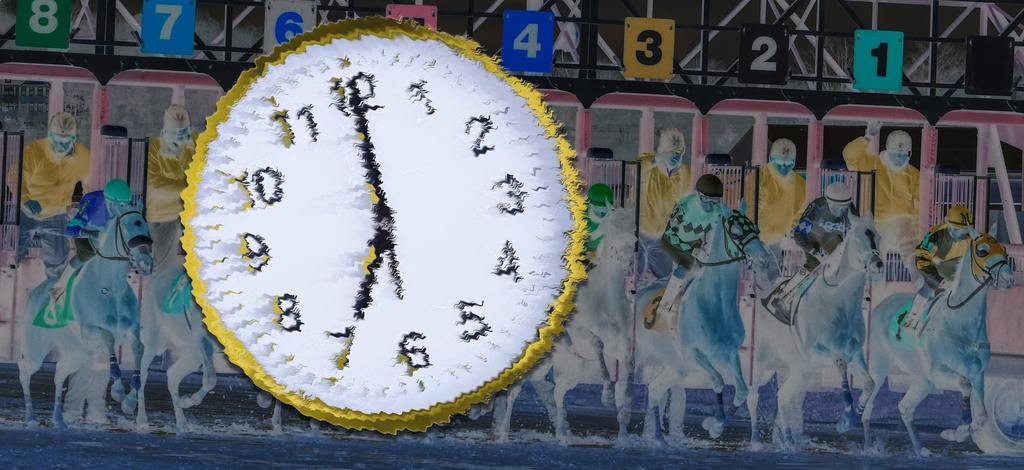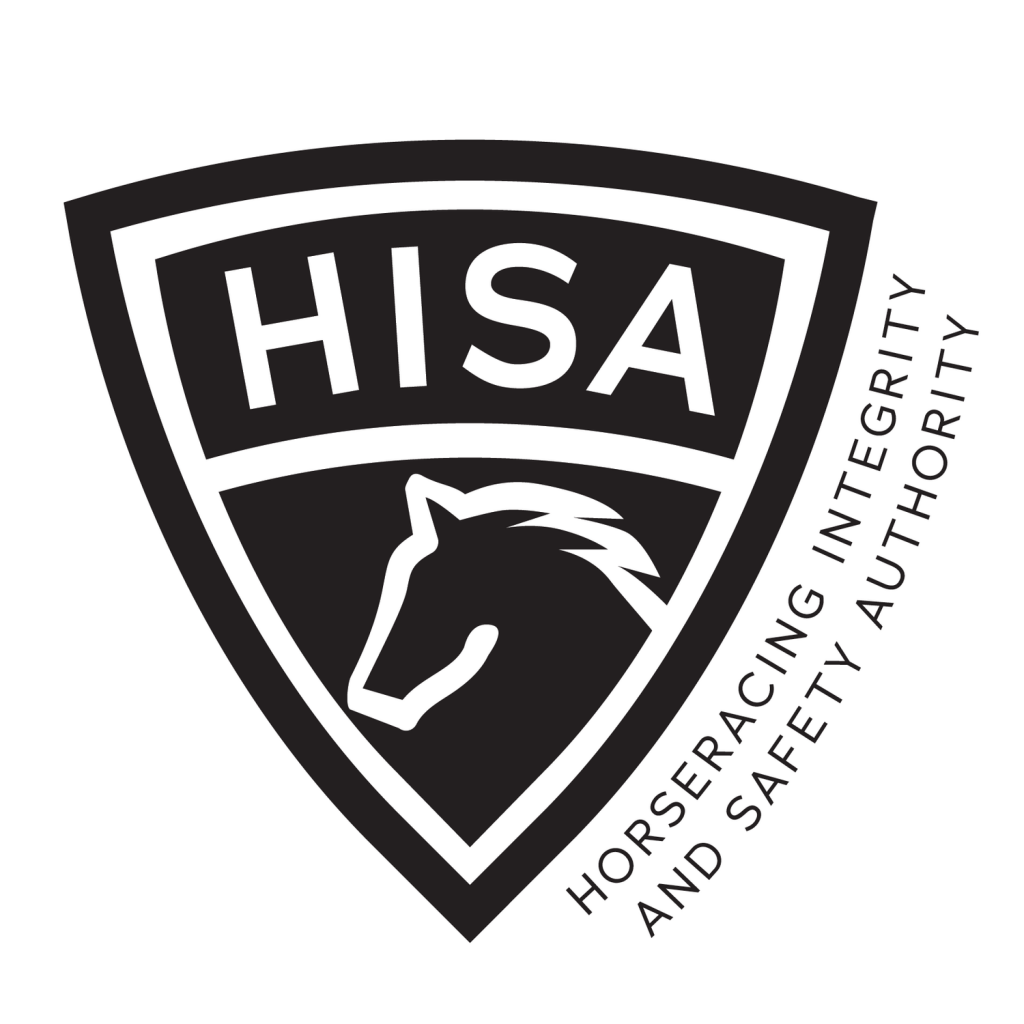
Racing Photo by Dottie Miller Rosales/Graphic by Maribeth Kalinich
Op/Ed by Maribeth Kalinich with commentary from Jonathan Stettin
The award-winning, acclaimed News Magazine show, 60 Minutes, featured in their third segment Sunday night, horse racing. And it wasn’t pretty.
Reported by Cecilia Vega and produced by Sarah Koch, the piece was a mix of old news, sensationalism, the same ol’ and the current mess that just seems to get messier.
In PETA-like fashion they paraded horse deaths that occurred this year at various U.S. tracks.
As usual, Bob Baffert was featured as the highest profile trainer. Also shown was Baffert’s trainee, Havnameltdown, who threw Luis Saez in the dirt as he broke down on the Preakness undercard (after a hard bump at the start). Bob and Jill Baffert were devastated by the loss as they said when National Treasure won the Preakness.
There was some credible information in the report.
Included was the FBI investigation and subsequent convictions of Jorge Navarro, Jason Servis and veterinarian Seth Fishman. Interesting but old news.
Navarro was sentenced to five years in December of 2021, Fishman to eleven. Servis was sentenced in July 2023 to four years.
Former FBI Agent Shawn Richards comments were compelling. Change a molecule in a drug and it is then undetectable in a test.
In my view, likely an unpopular one in the industry, racing needs policing not a regulatory industry. Much of what goes on breeches to the criminal level, but nobody cares. The second wave of arrests the industry was told was coming never came. Yes, the wheels of justice move slow, but if they are coming it is a crawl pace. Shawn would need his old badge, handcuffs, and firearm along with arrest powers to have the needed impact.
Jonathan Stettin
The insight Meadowlands owner Jeff Gural, who initiated the FBI investigation, was also engrossing. “You’d see a horse going at a certain speed and the next week a new trainer would take over and the horse would be going two seconds faster.”
“And that, in your opinion is a giant red flag,” Vega said.
“It’s impossible,” Gural responded.
“It’s impossible to get a horse to go two seconds faster and you would see it consistently.”
“What do you think drove these guys?” Vega asked.
“Greed. The same thing that drives everybody,” Gural concluded.
Leading the charge to eradicate PEDs Gural continues to be diligent on the topic.
Gural banned trainers he suspected of doping at the Meadowlands and hired retired police officer Bryce Cody to conduct surprise blood and urine tests.
If you want to race at Meadowlands, you must sign an agreement that says that track officials can show up at your barn at any time and ask your veterinarian to supply them with a drug sample and they can do whatever they want with it.
And Gural hired the investigative firm Five Stones, who also works for The Jockey Club.
Lisa Lazarus spoke on behalf of the Horseracing Integrity & Safety Authority (HISA). When asked about doping she stated “HISA is here now and it is going to addressed. There’s clearly a problem that needs to be addressed. We’ve got people to fight it.”
“We owe it to the trainers who have spent their lives in this sport and who are, who have an incredible amount of integrity to get rid of those who are tarnishing the sport.”
Vega asked: “We’re talking about the most high-profile races in the year in this country, do you think drugs had anything to do with these deaths?
“You know, that’s a great question. Now that we have oversight, I’m confident that we have to do our jobs,” Lazarus offered in response.
According to Churchill Downs’ final report on their investigation there were no correlations found in the 12 deaths nor did they find any evidence of drugs in any of the horses.
Lazarus later stated: “It will take years for a truly clean sport.”
Our own Jonathan Stettin weighed in on some of what Lisa Lazarus said:
I think Lisa is a very intelligent leader of HISA and I would like to believe her heart is in the right place, but I think she got a few things wrong. First and foremost while the industry certainly owes the trainers who live their life for the game, they are not the priority and come second to the horses. She may feel that way but it is not what she said. If you substitute the word horses for trainers I think she’d be on a better course. Additionally, there are things that go on on the backside that have become acceptable, routine, and all of them are not in the best interest of the horses, but the business of horse racing. Next, she has a lot of people in her ear in effort to improve policies and procedures. While that is a good thing, and these people are knowledgeable, you have to ask the question, are their self interests guiding their advice and recommendations. I’d rather see people without deep rooted financial interests affected by HISA policies in her ear. Such people exist, but as far as I can see none are at the table.
Jonathan Stettin
The Jockey Club’s Stewart Janney also spoke with Vega.
“How big of a problem is doping in horse racing?” asked Vega.
“It’s a big problem,” responded Janney.
“It strikes at the integrity of the sport. It’s not good for the horses. There’s just nothing about it that’s acceptable,” he added.
“What has horse racing regulation been like over the last 50 years?” asked Vega.
“A failure,” Janney emphatically said.
“Increasingly so,” he added.
“It’s gotten worse.” commented Vega.
“It’s gotten worse. And, quite frankly, states have not done their job,” Janney added.
Vega remarked: “When you talk about something that’s sounds like it’s as institutionalized as corruption has been, I don’t know how you clean that up.”
“Well, I think you put people away. You send them out of the sport. And some of them go to jail,” Janney said.
Janney also said they want the big fish not the little guy. “The important people who are corrupting the sport,” he said.
Like Lisa, Stuart mentioned the business aspect before the horses. maybe I’m nitpicking, and I am not questioning either of their love or care for the animals, as I know neither one personally, but in my opinion until we realize the horses and whaat is best for them comes first, the sport is on borrowed time.
Jonathan Stettin
Although you would never know it by the latest headlines.
Facts stated were that since the Horseracing Integrity & Welfare Unit (HIWU) opened its doors in May, 33 trainers have been suspended for banned substances. (Were Poole, Wong, Lauer or Palma included in that number?)
There was no mention of the smaller trainers whose businesses were recently put on hold or who were even put out of business by charges on minor, even erroneous violations because they cannot afford legal defense for appeals.
No mention of the vast resources and support for aftercare, the hard work put into rehoming and retraining these beloved equines and showcasing these organizations. It would be nice if mainstream media could feature something positive about U.S. Thoroughbred Horseracing occasionally.
Deaths at Churchill were what 60 Minutes led with. Deaths at Saratoga were what they closed with. Horses breaking down and doping scandals sandwiched in between. Not a pretty picture of Thoroughbred horseracing in the U.S. HISA has some monumental tasks in front of them.
I have had Lisa Lazarus on my show, I would love to have an opportunity to speak with Shawn Richards on the show. I believe it would be helpful. My stake is I like to bet on horses. I used to love to bet on horses. 60 minutes showing Bob Baffert on this show talking about a betamethasone positive then morphing into Servis and Navarro and some who knows what substance called “monkey” wreaks of sensationalism and shows how far we actually have to go to get a handle on the reality of the sport, what goes on and why, and what counts. I mean they didn’t even say under current HISA rules the betamethasone wouldn’t even be a violation as I understand it.
Jonathan Stettin
If you’d like to catch our interview with Lisa Lazarus you can right here. It is a bit old now and much has happened, but it is still worth seeing.



